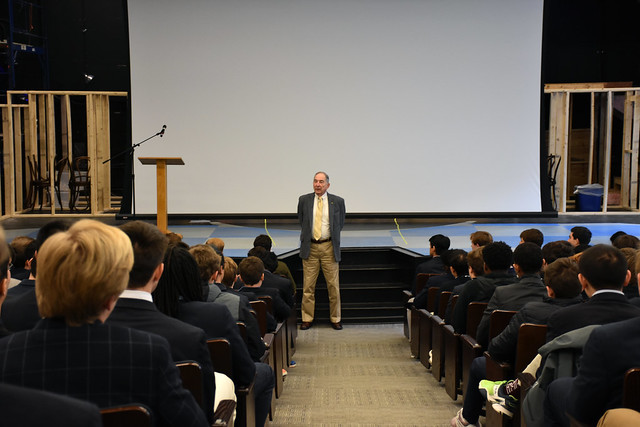STA News
A Personal View of War and Holocaust
Holocaust survivor Emanuel “Manny” Mandel shared his childhood memories of World War II and his internment at Bergen-Belsen Concentration Camp at Upper School assembly this week. The Mandel family moved to Budapest, Hungary, soon after Manny’s birth in 1936. At age six, he entered first grade, attending a neighborhood school visible from the windows of his family’s apartment. He walked himself to school, a yellow star affixed to his jacket. As a young boy, he thought the star was “a mark of distinction.” Only later did he realize it made him a target—and that his parents had secretly followed him to school each day to make sure he arrived safely. When he later asked for a bicycle, he was told no. “I’m not going to let you out of my sight,” his father said.
In March 1944, the Germans occupied Hungary, which had been allied with Germany as one the Axis powers. In June of that year, Mandel and his mother left Hungary on a train–ostensibly part of an exchange negotiated by Adolf Eichmann and the Jewish Rescue Committee to release hundreds of Hungarian Jews in exchange for trucks and valuables. (His father remained behind, in forced labor.) The refugees were told they were traveling to a port—to Spain or Portugal—but instead were taken to the Bergen-Belsen Concentration Camp, where Mandel and his mother lived for six months, before being taken to Switzerland, where he lived in a children’s home for the rest of the war. “They didn’t kill us,” said Mandel, “because you can’t barter with dead bodies.”
At Bergen-Belsen, Mandel spent most of his time doing two things: “being bored—we had nothing to do—and being sick.” Capturing a child’s view of camp life in stark but vivid detail, Mandel recalled the warmth of mustard plasters on his pneumonic chest; breakfasts of dark liquid and bread; afternoon meals of a lumpy, lighter brown liquid; and shoes that fell apart from constant exposure to mud. He also described school, worship, and the opening of “businesses” in camp. “People would make jewelry out of a tin can and barter that for a haircut or cigarettes or shoes,” recalled Mandel. “When under duress, humans try to restore normalcy.”
“We can’t learn from the future,” noted Mandel, “but we should learn from the past.” Asked whether something like the Holocaust could happen in the future, Mandel, now 83 and a volunteer with the Holocaust Museum’s Office of Survivor Affairs, pulled a cell phone out of his pocket and said: “This thing is a guarantee that we can no longer have secret wars. Atrocities can still happen, but not like this, ongoing across a continent.”
In March 1944, the Germans occupied Hungary, which had been allied with Germany as one the Axis powers. In June of that year, Mandel and his mother left Hungary on a train–ostensibly part of an exchange negotiated by Adolf Eichmann and the Jewish Rescue Committee to release hundreds of Hungarian Jews in exchange for trucks and valuables. (His father remained behind, in forced labor.) The refugees were told they were traveling to a port—to Spain or Portugal—but instead were taken to the Bergen-Belsen Concentration Camp, where Mandel and his mother lived for six months, before being taken to Switzerland, where he lived in a children’s home for the rest of the war. “They didn’t kill us,” said Mandel, “because you can’t barter with dead bodies.”
At Bergen-Belsen, Mandel spent most of his time doing two things: “being bored—we had nothing to do—and being sick.” Capturing a child’s view of camp life in stark but vivid detail, Mandel recalled the warmth of mustard plasters on his pneumonic chest; breakfasts of dark liquid and bread; afternoon meals of a lumpy, lighter brown liquid; and shoes that fell apart from constant exposure to mud. He also described school, worship, and the opening of “businesses” in camp. “People would make jewelry out of a tin can and barter that for a haircut or cigarettes or shoes,” recalled Mandel. “When under duress, humans try to restore normalcy.”
“We can’t learn from the future,” noted Mandel, “but we should learn from the past.” Asked whether something like the Holocaust could happen in the future, Mandel, now 83 and a volunteer with the Holocaust Museum’s Office of Survivor Affairs, pulled a cell phone out of his pocket and said: “This thing is a guarantee that we can no longer have secret wars. Atrocities can still happen, but not like this, ongoing across a continent.”
Located in Washington D.C., St. Albans School is a private, all boys day and boarding school. For more than a century, St. Albans has offered a distinctive educational experience for young men in grades 4 through 12. While our students reach exceptional academic goals and exhibit first-rate athletic and artistic achievements, as an Episcopal school we place equal emphasis upon moral and spiritual education.





